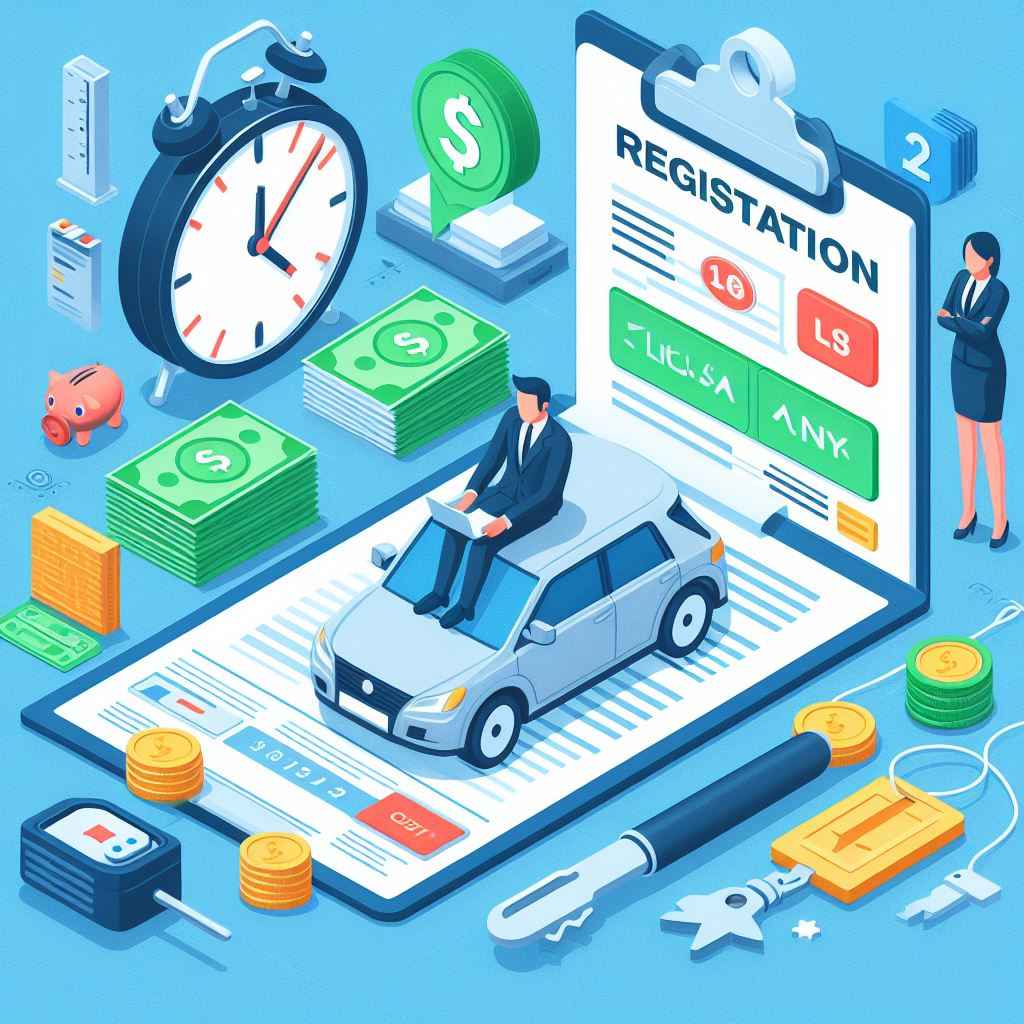If you’re in need of quick cash and own your vehicle free and clear, a registration loan from a lender near you could be the financial solution you’re looking for. Registration loans, also known as title loans or pink slip loans, allow you to borrow money by using your car’s title as collateral. The loan amount is based on the value of your vehicle.
Registration loans are a popular option for those who need money fast and may not qualify for traditional loans due to credit issues or lack of collateral. They offer a simple application process, quick funding, and allow you to continue driving your car while repaying the loan.
In this article, we’ll cover everything you need to know about finding registration loans near you, including:
- What is a registration loan and how does it work?
- Benefits and risks of registration loans
- How to find reputable registration loan providers in your area
- The application process and what you’ll need to qualify
- Tips for comparing lenders and getting the best rates and terms
- Alternatives to consider before taking out a registration loan

What is a Registration Loan?
A registration loan is a short-term loan that uses your vehicle’s title as collateral. Also referred to as an auto title loan or pink slip loan, this secured loan allows you to borrow a lump sum of cash based on a percentage of your car’s resale value, typically up to 50%.
You can usually borrow between $100 to $10,000 or more, depending on your vehicle’s appraised value, your income, and the maximum loan amounts allowed in your state. Loan terms are usually 15 to 30 days but can extend up to a year.
The biggest benefit of registration loans is that you can get approved and funded very quickly, often within 24 hours. Lenders focus more on the value of your car than your credit history. This makes registration loans an accessible option for those with bad credit, no credit, or who can’t get approved elsewhere.
To get a registration loan, you simply need to own your vehicle outright and have a clear title in your name. You’ll also need to provide some documentation like proof of income and residency. If approved, you give the lender your car title in exchange for the cash. You can continue driving your vehicle as you repay the loan. Once you’ve repaid in full, the lender signs the title back over to you.

How Do Registration Loans Work?
The registration loan process is quite simple and straightforward:
- You fill out an application online, by phone, or at a lender’s storefront location. You provide information about yourself, your income, and your vehicle.
- The lender appraises your vehicle to determine its current market value. This is usually done by inspecting the car in person.
- Based on your vehicle’s value and your income, the lender determines the maximum loan amount you qualify for. Typically, you can borrow up to 50% of your car’s value.
- If approved, you provide the lender with your vehicle’s title and any other required documentation like proof of income and a valid government-issued ID.
- The lender provides you the loan funds either by cash, check, or direct deposit into your bank account, usually within 24 hours or less.
- You continue driving your car as normal while making payments according to the loan agreement. Loan terms are usually 15 to 30 days but can extend up to a year in some cases.
- Once you repay the loan in full, including interest and fees, the lender removes their lien and signs the title back over to you. You once again own the vehicle free and clear.
If you default on the loan by missing payments, the lender has the right to repossess your vehicle to recoup their losses. So, it’s important to only borrow what you can afford to repay and to communicate with your lender if you’re facing difficulty making payments.

Benefits of Registration Loans
There are several advantages to getting a registration loan when you need quick access to cash:
- Fast approval and funding, usually within 24 hours
- Simple application and minimal documentation required
- No credit check required in most cases
- Bad credit or no credit is OK
- You can keep driving your vehicle while repaying the loan
- Loan amounts up to 50% of your car’s value, typically $100 to $10,000 or more
- Repay over time with manageable monthly payments
- Get cash for any purpose like bills, emergencies, car repairs, etc.
Registration loans can provide peace of mind when you’re facing a financial emergency or cash shortfall. As long as you have a vehicle with a clear title and sufficient income, you can likely get approved even with imperfect credit.

Risks of Registration Loans
While registration loans offer fast funding and easy approvals, there are some potential downsides to be aware of:
- High interest rates and fees compared to other loan options
- Loan amounts are limited by your vehicle’s value
- Short repayment terms can mean high monthly payments
- Risk of vehicle repossession if you default on the loan
- May encourage a cycle of debt if you repeatedly extend the loan
- Not a long-term financial solution for ongoing money troubles
The biggest risk is losing your transportation if you can’t make the payments, since the lender can repossess your car to recoup their money. Registration loans also tend to carry high rates compared to other options, with APRs often exceeding 100%.
For these reasons, it’s important to carefully consider the costs and whether the monthly payment fits your budget. Only borrow what you need and have a plan for repayment. Explore all other options before turning to a high-interest registration loan.

Finding Registration Loans Near Me
If you’ve decided that a registration loan is right for your financial situation, the next step is finding a reputable lender in your area. Here are some tips for locating registration loan providers near you:
- Search online for “registration loans near me” or “title loans in [your city]”
- Check online review sites like Google, Yelp, and the Better Business Bureau for lender ratings and customer experiences
- Ask friends and family for referrals to lenders they’ve personally used
- Look for storefront lenders in your neighborhood or nearby towns
- Beware of online lenders without a physical address or contact information
- Confirm the lender is licensed to offer registration loans in your state
When evaluating potential lenders, consider factors like their reputation, fees, loan terms, and customer service. Read all paperwork carefully before signing and make sure you understand the total cost of borrowing. Don’t be afraid to ask questions and walk away if something doesn’t feel right.
The Registration Loan Application Process
Once you’ve chosen a lender, the application process for a registration loan is usually quick and straightforward. Here’s what you can expect:
- Fill out an application online, by phone, or in person at the lender’s location. You’ll provide basic information about yourself, your income, and your vehicle.
- Wait for the lender’s approval decision. This can take as little as a few minutes or up to a few hours if more information is needed.
- Review and sign the loan agreement outlining the terms, interest rate, fees, and repayment schedule. Make sure you understand and agree to all terms before signing.
- Provide the signed title to your vehicle to the lender. They will place a lien on the title until the loan is repaid.
- Receive your loan funds via cash, check, or direct deposit. Then make payments according to the agreed schedule while continuing to drive your car as normal.
- Provide documentation to verify your information, which may include:
- A valid government-issued ID
- Proof of income like recent pay stubs or bank statements
- Proof of residency like a utility bill in your name
- Your vehicle for inspection to assess its value
- The clear title to your vehicle in your name
The whole process can be completed in as little as an hour in some cases. However, it’s important not to rush the decision. Take the time to understand the costs and compare offers from multiple lenders before signing an agreement.

Comparing Registration Loan Lenders
Not all registration loan providers are created equal, so it’s wise to shop around and compare your options. Here are some key factors to consider when evaluating lenders:
- Interest rates and fees: Look for the lowest APRs and most reasonable fees. Avoid lenders that charge hidden or excessive fees.
- Loan terms: How long will you have to repay and what will the monthly payments be? Make sure the repayment plan fits your budget.
- Loan amounts: Does the lender offer the amount of cash you need? Can you borrow extra if needed?
- Reputation: Check reviews and ratings from past customers. Make sure the lender is licensed and has a history of fair lending practices.
- Customer service: Is it easy to reach a representative by phone or email? Do they take the time to answer your questions?
- Application process: How easy and fast is it to apply and get approved? Can you complete the process online or by phone?
- Funding speed: How quickly will you have access to the loan funds after approval? Will the money be available the same day?
- Flexibility: What happens if you need an extension or want to pay off the loan early? Look for lenders with flexible repayment options.
By comparing multiple lenders, you can find the most competitive rates and favorable terms for your situation. Don’t just go with the first lender you find without seeing what else is out there.
Alternatives to Registration Loans
Before committing to a high-interest registration loan, it’s worth exploring other financial options that may be less costly or risky. Here are some alternatives to consider:
- Personal loans from a bank, credit union, or online lender
- Cash advances from a credit card
- Borrowing from family or friends
- Selling unnecessary items for cash
- Picking up a side job or working overtime
- Negotiating with creditors for more time to pay
- Seeking assistance from a local nonprofit or charity
- Using savings or an emergency fund if available
While not all of these options may be possible depending on your situation, it’s important to weigh the costs and benefits of each before choosing a registration loan. A financial advisor or credit counselor can also provide guidance on managing your money and exploring alternatives.
The Bottom Line
Registration loans can provide a fast solution when you need cash quickly and have limited options due to bad credit or lack of collateral. By using your vehicle title as security, you can access a lump sum of money to cover expenses while continuing to drive your car.
However, registration loans also come with high costs and the risk of losing your vehicle if you can’t make the payments. It’s essential to carefully consider the terms, shop around for the best deals, and have a solid plan for repayment before signing on.
If possible, explore alternatives that may be less expensive or risky first. But if a registration loan is your best option, be sure to work with a reputable lender and borrow only what you can afford to pay back. With responsible use, a registration loan can be a helpful tool for managing a short-term cash crunch.












